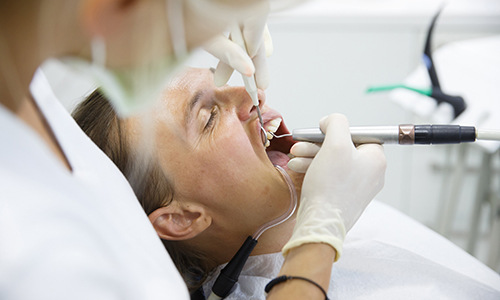Periodontics is the branch of dentistry that focuses on the prevention, diagnosis, and treatment of diseases of the periodontium, which is the tissue that supports and surrounds the teeth. This includes the gums, jawbone, ligament, and cementum.
Periodontists are highly trained specialists who have received additional education and training beyond dental school. They are experts in treating periodontal disease, which is a chronic inflammatory disease that affects the gums and bone supporting the teeth.

Periodontal disease is the leading cause of tooth loss in adults. It is also linked to other serious health problems, such as heart disease, stroke, and diabetes.
Periodontists play an important role in helping patients maintain good oral health and prevent periodontal disease. They also provide a variety of treatment options for patients who have periodontal disease, including scaling and root planing, gum surgery, and dental implants.
Here are some of the services that periodontists provide:
- Prevention: Periodontists can help patients prevent periodontal disease by providing education on oral hygiene and risk factors, and by recommending preventive treatments, such as scaling and root planing.
- Diagnosis: Periodontists can diagnose periodontal disease by performing a clinical examination and taking X-rays. They may also perform additional tests, such as measuring the depth of the pockets around the teeth.
- Treatment: Periodontists offer a variety of treatment options for periodontal disease, depending on the severity of the disease and the patient’s individual needs. Treatment options may include scaling and root planing, gum surgery, and dental implants.
If you are concerned about your periodontal health, or if you have been diagnosed with periodontal disease, it is important to see a periodontist. Periodontists can help you develop a treatment plan to protect your teeth and gums and maintain good oral health for a lifetime.
Treatment and Prevention
In certain cases, periodontal surgery may be recommended. Periodontal surgery is a procedure to remove bacteria from beneath the gums and repair any damage to the gums or bone. There are several types of periodontal surgery, including:
- Pocket reduction surgery: This surgery reduces the depth of the pockets around the teeth, making it easier to clean the area and prevent bacteria from accumulating.
- Soft tissue grafts: This surgery grafts tissue from another part of the mouth to cover exposed roots or repair gum damage.
- Bone regeneration: This surgery uses bone grafting material to rebuild bone that has been destroyed by periodontal disease.
Dental implants can be used to replace teeth that have been lost to periodontal disease. Dental implants are artificial tooth roots that are surgically placed in the jawbone.
Prevention is the best way to avoid periodontal disease. Good oral hygiene, including daily brushing and flossing, is essential for keeping plaque at bay. Regular dental visits and professional cleanings can also help to prevent periodontal disease.
Here are some additional tips for preventing periodontal disease:
- Avoid smoking and excessive alcohol consumption.
- Eat a healthy diet that is low in sugar and processed foods.
- Manage stress, as stress can worsen periodontal disease.
